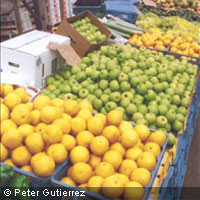EU research finds organic food healthier and better
A European project has found that some organic foods, such as fruit, vegetables and milk, could be more nutritious than non-organically produce and contain higher concentrations of antioxidants, believed to cut the risk of heart disease and cancer. The early results of the Quality Low Input Food (QLIF) project showed that organic fruit and vegetables contained up to 40% more antioxidants than non-organically grown produce. And even greater contrasts were found for milk, with organic varieties containing up to 60% more antioxidants and healthy fatty acids. The coordinator of the project, Professor Carlo Leifert of Newcastle University in the UK, has announced to the press the findings of the biggest ever research project on the benefits of organic farming and food. He said the results suggested that eating organic food was equivalent to eating an extra portion of fruit and vegetables a day. 'There is enough evidence now that the level of good things is higher in organics. Therefore, we challenge the FSA to now recognise and publicly acknowledge the nutritional benefits of organic food produced through well-managed organic farming systems,' said Professor Leifert. As part of the four year project, Newcastle University researchers raised cattle and grew fruit and vegetables, including cabbages, lettuces, carrots, potatoes and wheat, on organic and non-organic farm lands across Europe. They then compared factors such as taste and nutritional quality. The project's findings contradict advice by the UK Government's Food Standards Agency (FSA), which currently states: 'Consumers may also choose to buy organic food because they believe that it is safer and more nutritious than other food. However, the balance of current scientific evidence does not support this view.' The project began in March 2004 and has a grant of ¿18 million under the 'Food quality and safety' theme of the EU's Sixth Framework Programme (FP6). Some 31 research centres, companies and universities in Europe and beyond make up the project consortium. Their common aim is to increase value to both consumers and producers using a fork to farm approach. Professor Leifert said that he and his team now want to explore the underlying mechanisms by which organic as opposed to non-organic farming methods lead to such higher concentrations of healthy nutrients. A spokeswoman for the Soil Association told the press that the findings of the project showed that the FSA should change its stance and that this could be the start of a significant change in what consumers buy. According to market research, European consumers want tasty, safe, affordable and nutritious food which does not harm the environment. 'Low input' farming, which aims to avoid the use of synthetic pesticides and fertilisers, could respond to consumer demand. The final results of the project are expected to be published in a peer reviewed journal over the course of the next 12 months.
Countries
United Kingdom



